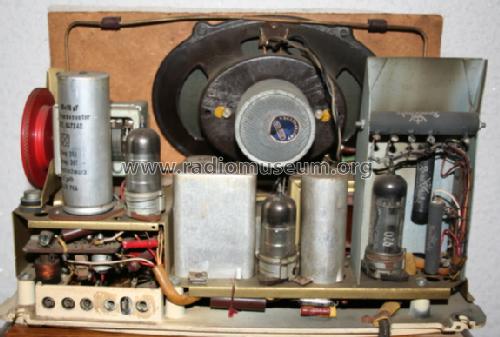- Country
- Germany
- Manufacturer / Brand
- Grundig (Radio-Vertrieb, RVF, Radiowerke); Fürth/Bayern
- Year
- 1951/1952
- Category
- Broadcast Receiver - or past WW2 Tuner
- Radiomuseum.org ID
- 1908
-
- alternative name: Grundig Portugal || Grundig USA / Lextronix
Click on the schematic thumbnail to request the schematic as a free document.
- Number of Tubes
- 4
- Number of Transistors
- Semiconductors
- 220E60
- Main principle
- Superheterodyne (common); ZF/IF 468/10700 kHz
- Tuned circuits
- 6 AM circuit(s) 6 FM circuit(s)
- Wave bands
- Broadcast, Short Wave plus FM or UHF.
- Power type and voltage
- AC/DC-set / 110; 125; 220; 240 Volt
- Loudspeaker
- Permanent Magnet Dynamic (PDyn) Loudspeaker (moving coil) - elliptical
- Power out
- 3 W (max.)
- Material
- Bakelite case
- from Radiomuseum.org
- Model: 1002GW [UKM] - Grundig Radio-Vertrieb, RVF,
- Shape
- Tablemodel without push buttons, Mantel/Midget/Compact up to 14
- Dimensions (WHD)
- 302 x 187 x 145 mm / 11.9 x 7.4 x 5.7 inch
- Notes
-
Ausführung elfenbeinfarbig DM 205.-
Zitat aus dem VERG-Katalog 1951/52: "1002GW kann auch auf Wunsch mit einem zusätzlichen L-Bereich dem Handel zur Verfügung gestellt werden."
UKW-Demodulation mit Flankengleichrichter.
- Net weight (2.2 lb = 1 kg)
- 3.2 kg / 7 lb 0.8 oz (7.048 lb)
- Price in first year of sale
- 200.00 DM
- Source of data
- Kat.d.Rundf.GrossH.1951/52 / Radiokatalog Band 1, Ernst Erb
- Literature/Schematics (1)
- - - Manufacturers Literature (Grundig Kleeblatt-Serie 1952)
- Other Models
-
Here you find 6212 models, 5445 with images and 4211 with schematics for wireless sets etc. In French: TSF for Télégraphie sans fil.
All listed radios etc. from Grundig (Radio-Vertrieb, RVF, Radiowerke); Fürth/Bayern
Collections
The model is part of the collections of the following members.
Forum contributions about this model: Grundig Radio-: 1002GW
Threads: 1 | Posts: 1
Es gibt zu dem Modell noch ein Sondermodell, der nicht in die Kataloge kam. Es ist ein abgespecktes Modell mit einem Wellenbereich (MW) und Messing Seitenzierteilen. Laut einem ehemaligen Grundig Mitarbeiters wurde das Modell nur als Gewinn diverser Grundig Preisaussreiben und als Werbegeschenk an Radioläden produziert in geringer Auflage. das Gerät hat keine Typenbezeichnung und eine Röhre weniger.
Dietmar Rich, 29.Jul.03































